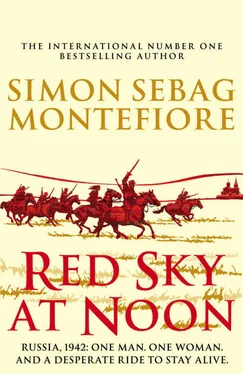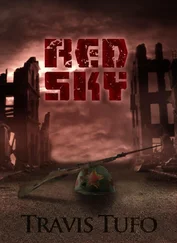‘I have in front of me your signed confession, Prisoner Golden,’ said Ulrikh.
‘It’s false! I’m not guilty of anything!’
‘Quiet, prisoner!’ shouted Ulrikh, banging the table.
‘Did you or did you not sign this?’ asked Satinov in his Georgian accent.
‘No!’ Benya replied. ‘You see, I had no choice – I was beaten. My confession was forced out of me. I deny everything, I was tortured…’
Ulrikh wiped his flat face with his liver-spotted hand. It had been a long vodka-fuelled night of Vishkas – prisoners condemned and executions attended – and Benya could see he wanted to send his report to Comrade Stalin and get to bed.
‘A signed confession carries the full force of the law,’ said Ulrikh, sounding both furious and indifferent. ‘The sentence stands, the verdict is final and to be effected without delay…’
Benya started to hyperventilate. A drop in the belly like the trapdoor of a gallows and then a drenchingly fearsome nausea that buckled his knees; he thought he would die then and there. The guards caught him and held him up like a broken mannequin.
Then Satinov leaned sideways and whispered to Ulrikh. Satinov was the top man present, he was Stalin’s comrade-in-arms, and he was not a judge. He was there for a special reason. Stalin had nominated him to be the ‘curator’ of the trial because Satinov had been friends with the people whom he was going to have to sentence to death. That was a test set by Stalin.
Ulrikh shrugged, and Satinov cleared his throat. ‘Prisoner Golden, your death sentence is reprieved. Instead, you are sentenced to ten years…’ And the rest was lost in the roar of relief in Benya’s ears. Did he really hear it? Yes. There it was. Ten years! The joy of life – all thanks to Satinov!
‘Thank you,’ Benya whispered to the judges but they were no longer paying him any attention. They were standing up, collecting their papers. He rushed forward but the guards caught him, shook him and held him back: ‘God bless you!’ he shouted.
‘No talking!’ A rifle butt in the side. ‘Silence, prisoner!’
A man who has heard his own capital sentence has lived more profoundly than any other, and for Benya Golden, nothing would ever be quite the same again. Now he could live, passionately, expansively. He could love again. Oh, how he loved life. He barely noticed the judges filing out of the room.
Then there was the march through the corridors and the ride in the Black Maria back to his cell, where he understood it all better. He was condemned to a realm beyond mere death, and now knew his entire life up to his arrest was over. He was almost dead, a death without instant decay, trapped while he still breathed, in the hell of the eternal now. He recalled the slaves who rowed the Roman galleys: now he was to be a galley slave, toiling to death in the Camps known as the Gulags. But then he thought: ten years! It is not forever. I can survive ten years and come back to life, can’t I?
Weeks and months of 1940 passed in that cell. He became accustomed to the routine but he knew that would soon end and every prisoner hates the change of rhythm. Change is dangerous. But he knew what was coming: the transfer, known as the etap, the journey to the east, to the Gulags.
And then it came. Four a.m. reveille. The guards burst into his cell. ‘Wake up! Get your things. Davay! Davay! Let’s go!’
Benya didn’t know where he was going, just that he was heading east in cattle cars, chugging slowly across the endless spaces of the Urals, Siberia and onwards. The trains were packed with filthy, lice-infested prisoners (many Poles, Benya learned, victims of Stalin’s new conquests), the stinking bucket overflowing with urine and dysentery. Sometimes Benya and his companions talked about Stalin’s astonishing alliance with Hitler, how they’d split Poland between them. Paris had just fallen to the Nazis. How long would Britain hold out? But mostly Benya just lay in his corner, saving his energy, trying to stay alive, learning to listen and not talk. Being a ‘Political’, he was the lowest in the hierarchy of the prisoners. Even murderers and thieves were higher than him, and the highest of all were the Criminals who ran the cattle car, received the best food and took whatever else they wanted. A quick shuffling amongst the huddling prisoners and a man was killed for his new boots in the gloom of Benya’s cattle car, quickly stripped for his clothes, coat, hat, ration. There was a sudden glare as the door was slid open; and Benya glimpsed the broken-ragdoll dance of arms and legs as a naked body was tossed out, filling the roaring frame of the open door for a second before the door slid shut again, and Benya wondered whether he had seen it at all. From then on, in this life, the death of a man, once an event remarkable and unforgettable, something you might tell your family or read about in the newspaper or discuss with a friend, was often merely an occurrence in a succession of occurrences for Benya, quickly forgotten in the drone of the day. The seething of lice on his body drove him crazy but he spent his days catching them and crushing them, feeling the pop of their bodies, a rare satisfaction, a lesson that small unlikely pleasures could make life almost tolerable. Sometimes he felt he had become the master of the enjoyment of minuscule things, and that that was the art of living.
He spent weeks at each transit prison – each one a world of its own, with its own rules of survival – until his next etap was called, and the next. A succession of cities. Petropavlovsk. Novosibirsk. Irkutsk. Everywhere his fellow prisoners said, ‘Pray you’re not going to Kolyma…’ But by the time he saw the blue waters of Lake Baikal, Benya knew that was exactly where he was going.
Still dazed after the horrors of the voyage in the hell ship across the Sea of Okhotsk, they arrived at Magadan, where a new world of snow-capped mountains, bracing air and the lunar landscape of the gold mines awaited them. Benya imagined the gold-rush towns he had read about in his beloved Jack London novels, the frontier of The Last of the Mohicans with its gunslingers, its trackers and Red Indians. It was still September, the last weeks before the Sea of Okhotsk froze, and Kolyma was about to be cut off from the mainland for many months.
The guards marched them up the hill in groups along a muddy lane called the Kolyma Highway and into a compound where Benya and his fellow prisoners were stripped, washed, shaved and their clothes steamed and deloused. In the showers, Benya saw men fall on each other, some on their knees, others bending over, coupling frantically, seizing white-knuckled fistfuls of gratification. Next day he stood naked in front of the medical examination board, a doctor and a Chekist, trying to look as weak and old as possible. But the doctor, a prisoner himself, stamped his file: ‘KOLYMA-TFT. Fit for Hard Physical Labour.’
‘But I’m not strong enough,’ protested Benya.
‘Shut the fuck up, cocksucker,’ said the guard. ‘The sentence for falsifying illness is Eight Grammes in the nut. For complaining you face the Isolator. Get a move on!’
Next day, he was woken at 4 a.m. ‘ Davay! Davay! Let’s go! Grab your belongings!’
Riding in a truck, fuelled not by petrol but by a furnace fired with wood, Benya travelled up the Highway into a mountain wilderness of rushing streams, reindeer herds and precipitous canyons. Then he saw first the barbed wire and watchtowers; next the wooden barracks and finally they entered the gate of their Camp: Madyak-7.
A giant sign declared:
GLORY TO STALIN THE GENIUS
GLORY TO STALIN OUR BELOVED LEADER
GLORY TO STALIN, FRIEND OF THE WORKING
CLASS, FATHER OF SOVIET CHILDREN
And finally at the bottom:
Читать дальше












